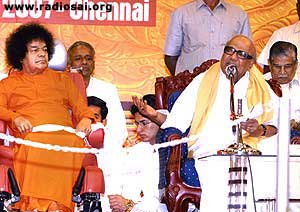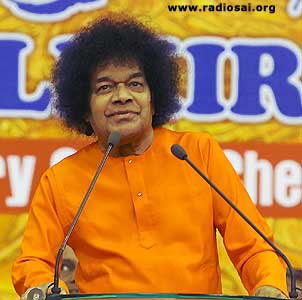|
THE CHENNAI CITIZENS’ CONCLAVE …DIVINITY DIFFUSES ALL DIFFERENCES
I wish to present a report on a historic public meeting that took place on 21st January, during Swami’s recent trip to Chennai. This meeting, formally called Chennai Citizens’ Conclave, was held in order to express the gratitude of the people of the city to Bhagavan for saving this huge metropolitan city from the misery of its drinking water shortage. Before I start describing the proceedings of the Conclave, I ought to, for the record, first say a few words about the age long drinking water problem Chennai had, and what part Swami played in solving the problem. Chennai, formerly known as Madras, came into existence thanks to the British. Not many are aware that it was in Madras that the British first landed in India. It is only later that they went to Bengal, founded the city of Calcutta, which remained the capital of British India till New Delhi came into existence to mark the coronation of King George V as the Emperor of India. Interestingly, the Dutch landed around the same time at a coastal village about 65 km south of Madras, and that village is known as Sadras. Because the Dutch had to retreat, Sadras continues to remain a small fishing village to this day. In the case of Madras, the story is very different. Normally, major habitations take root near a source of water like a river. Madras on the other hand came into existence simply on account of a historical reason – the British landed there. Right from the beginning, the British recognised that drinking water was a problem. The first attempt to deal with this was to erect a small dam across a river known as Kosasthalayar. This was not much of a river in the sense water flowed in it only when there were rains, which usually came during the North East Monsoon [generally during October to December]. Unlike the South West Monsoon [June to September], the NE Monsoon does not always deliver that much rain, at least in the Tamil Nadu [TN] region, so water was always a problem. The water from the dam across Kosasthalayar was taken via a canal to a tank known as Red Hills Lake. By the way, in the very early days, Swami often used to go with His hosts for a picnic to the Red Hills area.
In due course other water storage tanks were added, and they were all inter-connected. Initially, the water was used both for drinking and for agriculture. Later, most of the water was reserved purely for supplying drinking water, even as the city began to grow. As early as the fifties of the twentieth century, it became clear that growing as it was, and with no major source of water nearby, Madras was going to face a huge drinking water problem. Indeed, every time the rains failed, this problem became a harsh reality, the problems getting compounded as the city grew bigger and bigger.
Concerned citizens and officials did try to think of solutions, and soon it became clear that the only way to solve the drinking water problem was to somehow bring water from the Krishna river flowing up north in Andhra Pradesh. This realisation came quite early, even in the fifties. Conceptually, there was no difficulty in solving the problem – all it needed was a good long canal. As mathematicians would say, a solution existed. In fact a statement was made in Parliament many, many years ago that the Government would do something to solve the problem of drinking water for Madras by taking Krishna water to the city.
But then the human Mind that is so very capable of finding solutions to problems is equally capable of obstructing solutions. What I mean is that the three States through which Krishna flows, had an argument among themselves as to who has rights over Krishna water. The States concerned are: Maharashtra where Krishna rises, Karnataka through which Krishna then flows, and Andhra Pradesh [AP] through which Krishna then makes its way to the sea, namely the Bay of Bengal.
The issue of sharing river waters is always a very sensitive one. A tribunal was set up to address the issue of how Krishna water should be shared and fix the quantum of water to be made available. The Tribunal gave its verdict. Known as the Bachawat Award after the Chairman of the Tribunal, it was agreed that together, the three riparian States would contribute 15 TMC of water from the Krishna river to Madras city to meet its need of drinking water. One TMC by the way stands for a thousand million cubic feet, a term used by the British to quantify water supply for agriculture purposes. It is roughly equal to 30 million cubic metres of water. One million cubic metres can be visualised by imagining a tank that is 100 metres long, 100 metres wide and 100 metres high. One TMC is equal to 30 such tanks, and Madras was to get 15 TMC. By the way, it was felt that of the 15 TMC released at the source, about 3 TMC would be lost in transit and the city would end up with 12 TMC which was good enough for meeting its needs. Well, that was what was decided way back in the sixties or seventies, I do not remember exactly. As everyone knows, there is always a huge gap been intensions and implementations. The Tribunal had given its verdict but now it was up to the administrations in the various States to come together and get going. As is to be expected, there were many hiccups, even as governments came and went, thanks to uncertainties of election politics. Meanwhile, the TN Government floated a big scheme called the Veeranam Project, intended to bring water to the city from the river Kaveri flowing in the South. There was a lot of fanfare, and I was serving then in the Indira Gandhi Centre for Atomic Research in Kalpakkam – this was in the early seventies. The Veeranam Project was a high profile affair but it died in a scandal without a whimper. So, the cloud of uncertainty over the water supply situation in Madras remained as dark as ever. Finally, several years and many discussions later, in 1983, an agreement was reached to bring Krishna waters to Madras. This was largely through the personal initiatives of the Chief Ministers of Tamil Nadu and of Andhra Pradesh, both of whom happened to be famous film stars before they entered politics. In Tamil Nadu, the man at the helm was the charismatic M.G. Ramachandran, popularly known as MGR, who played Robin Hood in all his films and endeared himself to the masses. In Andhra the top man was N.T. Rama Rao who too was quite popular as a cine star, and absolutely unorthodox where politics was concerned. Interestingly, NTR as the Andhra Chief Minister [CM] was known, had started his career in Madras, because in those days Madras was the only major film city in the South. He thus had a soft corner for the city, and declared that having drunk the water the city for decades, it was his duty to come to its help in its hour of distress.
Thanks to the bonds created by the tinsel world, MGR and NTR came to an agreement regarding the details of the supply of Krishna water to Madras. At that time, NTR was engaged in launching an ambitious scheme to make massive use of Krishna waters to enhance enormously agricultural production in his State. He was seeking to do this via a grand scheme known as Telugu Ganga, a network of canals that would carry Krishna waters to every nook and corner of the State. As a part of the larger and grand Telugu Ganga scheme, NTR agreed to build a canal from a reservoir in AP, known as Kandaleru reservoir to the border of Tamil Nadu, for bringing Krishna water to Madras. This canal was to serve a dual purpose; on the one hand, it would bring 12 TMC of water to Madras, and on the other, it would serve as a major irrigation canal for the southern Districts of AP. Of course, NTR was not doing it for free; TN had to shell out a hefty five hundred odd crores of rupees for the execution of this canal as its share. At that time, the exchange rate was roughly thirty rupees to the dollar, and five hundred crores translates roughly as $ 160 million, not a small amount by any means.
In the NTR/MGR scheme, the canal from Kandaleru to Poondi would cross the inter-State border at a point called the Zero Point, and from there the TN Government was to construct a 25 km link canal to take the water to Poondi. So, on May 25, 1983, amidst much fanfare, the construction of the Kandaleru-Poondi canal, was formally inaugurated by Indira Gandhi, the then Prime Minister of India . Years passed, and after many crores were spent, on September 29, 1996, the Kandaleru Poondi canal was deemed to have been formally completed and this was recognised with a formal function at the Zero Point with Mr. Chandra Babu Naidu, CM of Andhra and Mr. M. Karunanidhi, CM of TN doing the honours.
The shouting and the cheering was over and all was set for water to flow from Krishna to TN. However, in practice, the water that flowed to Chennai was much less than what everyone hoped for and what the Bachawat accord had awarded. Where was the problem? In part, it was the paucity of rain, but the real culprit was the canal itself. It was substandard and it simply could not carry the water released without losses all the way to Madras. It was essentially mud work and therefore there were losses due to leakage and seepage. In addition, in many places, the canal walls had eroded badly. In short, the canal was no canal at all; at best, it was one long, lousy ditch!
Meanwhile, the NE Monsoon failed repeatedly, and Madras, by now renamed Chennai, was really reeling. I believe that H2H has graphically described all this and so I shall not repeat the painful details here. But this much I have to say; the rich and the middle class managed to survive by purchasing water but the poor were left high and dry. They had to scrounge as best as they could and often had to use gutter water in sheer desperation. That was the stark reality of a city that had recently become a big destination for IT.
Man thinks it is God who sends trouble, but God is not like that. He does not add to man’s burden; rather, He helps when man is in distress. Where Chennai residents were concerned (by this time, Madras had become Chennai), on January 19, 2002, something dramatic happened. It was the first anniversary of the Super Speciality Hospital in Bangalore and Swami went to Bangalore specially to attend the Health Meet arranged to mark the occasion. There were of course speeches galore and at the end of it all, there was as expected a Divine Discourse. In the course of the Discourse, Swami made a most unexpected announcement. He declared, “Today I have made a new resolve. Madras is suffering from acute shortage of drinking water. The rich can buy water sold by the tanker services but what about the poor? They have to depend on rain water that has collected in puddles and ditches, thus spoiling their health. I have therefore decided to work towards bringing drinking water to Madras, no matter how difficult and costly the task is. This wish of mine will fructify without fail. Success always springs from deep conviction.” By the way, January 19, is the anniversary of Sundaram (Swami’s residence) in Chennai; it was on this day, in 1981, I believe that Sundaram was blessed and formally inaugurated by Swami. The people of Chennai had not formally come to Puttaparthi to pray to Swami for drinking water. But already on October 19, 1997, at the time of handing over the Anantapur Drinking Water Supply Scheme to the people of Andhra Pradesh, Swami had declared that He had no differences of caste, creed, nationality, etc., and was ever ready to help one and all. This day, January 19, 2002 , He was telling the people of Chennai: “Why fear when I am here?” Work started soon. As all of us know, Swami becomes very keen once He gets set on a project. Thus, Bhagavan instructed the Sri Sathya Sai Central Trust to get busy and do all it can to make the Kandaleru-Poondi canal world class, so that Krishna water if available, can freely flow to Chennai. Now this canal extends about 150 km on the Andhra side, and about 25 km on the Tamil Nadu side before connecting with the Poondi reservoir near Chennai. Swami instructed the Trust to fix all the problems on the Andhra side, and, as usual, sparing no cost and wasting no time.
You might ask what about the TN side. Well, Swami wanted to fix that part also, but the then Chief Minister of TN, Ms. Jayalalitha, was, for her own reasons, not enthusiastic about this project. She was floating an alternate project to bring water from Kaveri. Actually, she was trying to resurrect the Veeranam project even though Kaveri water had in the meantime become a huge question mark, besides being much less in quantity. In short, Ms. Jayalalitha was preoccupied with her own project, and bothered little about this solution, though it was promising.
Anyway, under Swami’s Divine guidance, work proceeded swiftly on the Andhra side, and the best technology was employed this time. Some of you might have seen our documentary on the Chennai Water Project, wherein we have captured the highlights of the manner in which the project was executed in a most professional manner, using the best technology available. When Swami does something, it is always nothing but the best.
At this point I should share with you some statistics to give you a feel for the quantum of work involved.
I should also quote from an important letter written by Mr. Chandra Babu Naidu, then Chief Minister of Andhra Pradesh dated 7 May, 2003 , and addressed to Ms. Jayalaitha, then Chief Minister of Tamil Nadu. Please note the date. Swami made the announcement on January 19, 2002 and this letter was written by Mr. Chandra Babu Naidu on May 7 2003, just about a year later.
Unfortunately, there was hardly a response from TN side to this letter, which is not surprising since Ms. Jayalalitha was busy with her own solution to the Chennai Drinking Water Problem. Be that as it may, I would like you to note at this point, one important fact. The Kandaleru-Poondi Canal took the Andhra Government 13 long years to construct but here was the Central Trust making it world class in just around 13 months! That speaks volumes, does it not?
In 2003, we all thought that after He returns from Kodai, Swami would at some time go to Chennai for a grand inauguration of the Sai Ganga. Nothing like that happened. Instead, Bhagavan, as a part of His unfathomable Leela, suffered his first fracture. We fast forward and come to November 23, 2004 , the day of Swami’s 79th Birthday. On that day, water was formally released from Kandaleru to Chennai. A few days later, water reached the zero point crossing on Swami’s Birthday date according to the Telugu calendar. This was a happy event, with Sai Krishna getting the Krishna water released on His birthday according to one calendar and reaching that same water on His birthday according to another calendar! Soon after this, bus loads of Chennai residents converged on Prashanti Nilayam to express their gratitude and some of you might recall that Radio Sai broadcast excerpts from that thanks giving event. All that was in 2004. We fast forward again, and three years and one election later, Swami finally went to Chennai, because this time, the climate was congenial, shall I say! Swami, of course, went primarily for blessing the Yajna that He Himself had asked to be performed. However, it was widely expected that when Swami does go to Chennai, the city would for sure find a suitable way of expressing gratitude. Many leading citizens came together, and one thing led to another. Soon, the Government entered the act. The first indication we had of that was when Mr. Durai Murugan, Minister for Public Works in the DMK Government of TN came to Puttaparthi for Swami’s Darshan. He not only had Darshan but also went to the Hospital to look around personally. He was bowled over. It looks like when he went back, he told his boss, the Chief Minister about it. At this point, I should say something about this Chief Minister, because he has contributed his own share to make this recent visit of Swami a historic one. I make this digression because it would help not only the younger generation but also people in places elsewhere to appreciate the background of the Chennai Citizens’ Conclave better.
People in South India are very familiar with the Chief Minister [CM] Mr. M. Karunanidhi, popularly known as Doctor Kalaignar [a reference to the fact that he is a distinguished writer and honoured with a doctorate, honoriscausa]. Mr. Karunanidhi, now eighty plus, started off fifty years ago as not only a firebrand activist in the Dravida Kazhakam, a party with a strong anti-caste, and anti-Hindu stance, but also as a gifted author and screen-play writer. Karunanidhi shot to instant fame and became a household name in the early fifties, thanks to the powerful dialogues he wrote for the film Prashakti, that became a blockbuster, aided by superb acting of Shivaji Ganesan, who too shot to fame via the same film. It almost seemed that Karunanidhi wrote the film for Shivaji and that Shivaji was waiting for Karunanidhi to give him ‘The Film’ he wanted to start with. The Dravida Kazhakam, started by social activist E. V. Ramaswamy Naicker, popularly known as Periyar, was very popular, since it gave many angry young men a platform to ventilate their feelings of dissatisfaction with many aspects of society. But Periyar, for reasons of his own, stayed out of politics; this, however, did not please the young Turks, that included Karunanidhi. At one stage, when Periyar, then seventy plus married a young woman in her mid twenties, it gave a chance for the young Turks to breakout and form their own party, though Periyar continued to be their father figure. This party, known as Dravida Munnetra Kazhagam or DMK for short, entered politics and in 1967 created a sensation by not only sweeping the polls in Tamil Nadu, but, in the process, edged out the Congress which for decades had ruled the State. Since then, Congress has slipped into oblivion while the DMK and its splinter group ADMK took turns in ruling the state of Tamil Nadu. I should at this point mention that Ms. Jayalalitha leads the ADMK. In earlier times, she was a well known film star, and was the protégé of another famous film star, M.G. Ramchandran, whose name I have already referred to.
Many, especially those who are not from Tamil Nadu, might wonder why I am spending so much time discussing politics and all that. There is an important reason for it. Though the meeting held on January 21, 2007 was labelled Citizens’ Conclave, all the people on the dais that day, Swami excepted of course, were people from the world of politics. It was a strange coming together of various shades of political opinion [indeed from all across the country] and Divinity. As such, it is important to put the event in its proper perspective, instead of merely cataloguing who spoke first and who spoke next, etc. It was not merely a case of people with different shades of political opinion participating in the function. The real sensation was the presence of four people from the DMK on the platform - four people from a party that was supposed to be atheistic, and highly critical of religion as well as various religious practices. In particular, given his track record for pungently expressing atheistic sentiments, Karunanidhi, sharing the dais with Swami, raised many an eyebrow not only in Chennai, but became a national news story. It is therefore important to have a proper background to the entire sequence of events, so that one can understand better how, when the time is ripe, Swami unobtrusively shifts gears and effects changes in a subtle manner.
You will recall, the meeting in Chennai was really supposed to be a gathering where grateful citizens of the city expressed gratitude to Bhagavan. The question is: “How come the TN Government came into the picture?” That is an interesting question. At a higher level, the answer is obvious; the time had come, and Swami obviously made things happen the way they were supposed to according to His Divine Drama. Thus, a series of events took place.
No one would know all the details, except Swami of course, but in brief, the sequence of events is as follows. Firstly, the TN Minister for Public Works, the department that is in charge of water supply, etc., came to Puttaparthi. He came, he saw and he was conquered. He went back and reported to his boss. After this, the realisation dawned that Baba is the greatest benefactor on earth and that it would not be appropriate for anyone, be it an individual or even a state government, to ignore Him. The TN government began to feel that it would help a lot if gratitude is expressed to Swami for what He has already done, and maybe request Him also to do something to get the TN section of the Kandaleru-Poondi canal done up to the high quality that is now a reality in the Andhra segment. Meanwhile, Swami Himself announced that the next Ati Rudra Maha Yajna would take place in Chennai. He did not say He was attending it. Everyone expected Swami would, and acting on that assumption, people began to make all sorts of arrangements to receive Swami, and to pay their respects to Him. That was when the idea of the Citizens' Conclave took shape. The Tamil Nadu Government naturally came to know about it because the Conclave planners applied to the government to hire the huge indoor stadium near Central Station for the function. Almost immediately, the TN Government got into the act extending full support in many ways, including in the matter of security, etc. Not just that; the Government very much wanted to be a part of the action, which is how so many TN ministers were present on the dais that day and so many officials were to be seen all around, facilitating the function in every possible way. And to cap it all, on the evening of January 19, if I am not mistaken about the date, soon after we arrived in Sundaram, the members of the Mr. Karunanidhi’s family came to Sundaram to personally invite Bhagavan to visit their home, which He graciously did on the 20th, stunning not only Tamil Nadu but indeed the whole of India.
As Swami says, in His Divine Drama, things happen when samyam and sandarbham are right, that is, when the time and the circumstances are just what they ought to be. Thus came the unexpected visit of Swami to Karunanidhi’s house on January 20th which completely changed the tone of the Conclave held on the following day. For nearly fifty years and more, TN, a region seeped for centuries in the tradition of Bhakti (devotion) in all its aspects, had been facing some kind of turmoil, thanks to an aggressive socio active movement, which, in the process of crying out loud for much-needed social reform, took a strong atheistic stand in order to highlight evils perpetrated in the name of religion. Such protest movements have come about in all parts of the world, but where TN was concerned, it imposed great hardship on the genuine believers. The appearance of Karunanidhi and Swami on the same stage was an event that few would have forecast as late as end of 2006. Yet it did happen and this was the way Swami sent a signal to all His devotees, that in the end, God does give protection to the faithful. As I mentioned earlier, a climate of hostility to religion had been created in Tamil Nadu, initially by social activists. When later many of these activists entered politics and came to power, the tension and the pressures on the faithful increased manifold. But now, with people in power with strong anti-religious establishment feeling openly accepting and applauding Baba, at least Sai devotees can function and go about their spiritual work without much fear or opposition. That the present Government extended not only much courtesy but also made elaborate police arrangements both to manage vehicle movement and for crowd control, is sufficient indication that Swami has won the hearts of the so-called non-believers, a clear demonstration that Love can and does always triumph.
To get back to the story of the Conclave, soon after the Tamil Nadu Government got wind of Swami’s visit to Chennai, it entered into the act and the Conclave took a sharp turn, acquiring an altogether new complexion. Firstly, the people who were invited to speak were almost without exception all drawn from politics. In fact, there were only Chief Ministers, Governors, Ministers from Delhi and Ministers from the States who gathered on the stage to honour Swami! This was hardly expected in the beginning and yet it happened!
As far as the proceedings themselves are concerned, they took place in a large completely air-conditioned indoor stadium named Nehru Stadium built and owned by the Government. Interestingly, this stadium is located not far from the place where in 1983, the construction of the Kandaleru Poondi canal was inaugurated with much fanfare, and 13 years later was a huge flop, after much expenditure, of course. Prior to the event, I have been hearing from many weeks, all kinds of reports about the hectic preparations for this event, and it became clear that it would be a star function attracting attention not only in Chennai and Tamil Nadu but indeed in the whole country. There were three important reasons for this. First, of course, was the fact that the gathering included such a wide spectrum of political celebrities belonging to political parties with diverging views on almost everything. Secondly, there were at least two charismatic figures on the stage, each a celebrity in his own right; we had the ever ebullient Mr. Lalu Prasad Yadhav of Bihar , who never failed to be the centre of any event he participated in, with his unique style of speaking and inimitable personality. Then there was Mr. Karunanidhi, once a fire brand and now an elder statesman with a national profile rather that the stature of a mere state politician. Astute, shrewd, very calculative in his moves, and never given to rabble rousing, he is widely seen as one who would not have any truck with anything that even remotely smacks of religion or spirituality. Yet here he was, playing the leading role in expressing thanks to Swami, almost three years after water started flowing into the parched lakes of Chennai. He was daring to do something his predecessor, the actress-turned politician and mercurial personality Ms. Jayalalitha, refused to do, namely express gratitude to a towering benefactor, but for whose help at a critical moment, Chennai would still be in trouble. So it is no surprise that there was a great interest in the Conclave. Attendance was strictly regulated, partly on account of the limited seating capacity and partly on account of security reasons – with so many VVIPs gathering on one stage in one hall, one should not underestimate the headaches the security people were having.
With that background, I am now ready to start describing the events of the January 21, 2007 morning. All of us in Swami’s party were staying in Sundaram, which is where Bhagavan also was staying. Our daily routine was roughly as follows. We would all get ready early and await instructions from Swami’s room. When the word was out that He was going to the dining hall, all of us would go there too. We sort of had our places earmarked – I shall tell you all about that later – and we would take our seats when given the signal. After that, breakfast, in silence, of course. That morning, all the daily newspapers had been duly lined up at Swami’s table, since they were full of news and pictures about Swami’s historic visit to the residence of Mr. Karunanidhi the previous evening. People tried to compete with each other in drawing attention to the exciting news, but Swami did not show much interest; in a way, that was to be expected.
Breakfast was soon over and we were all wondering what next. The Conclave was due to start only at 11 am and the big question was: Would Swami visit the Yagna Salai (the Yagna site) first and then go or simply go direct from here. Meanwhile, Mr. Venu Srinivasan, the Chairman of TVS Motors, who was to deliver the welcome address at the Conclave, came to Sundaram to seek Swami’s blessings. Having received that, he pushed off. Meanwhile, Mr. Shiv Raj Patil, the Union Home Minister, and of course a long-time devotee and Mr. Gokuldas of Bombay showed up in Sundaram, and Swami asked them also to have breakfast. It was interesting that Mr. Patil, a lead speaker in the morning function, chose to come to Sundaram rather than go to the Governor’s residence, which he was entitled to do according to protocol.
Swami invited both Mr. Patil and Gokuldas and spoke to them for a few minutes. These two were apparently asked to follow Swami to the Conclave later that morning. Meanwhile, Swami enquired about the morning program, which was His way of getting things into motion. He was respectfully informed that it being a Sunday, there was, as expected, a huge crowd awaiting the Lord in the Yagna site. Accordingly, Swami decided to go to Yagna site first; after all, He had come to Chennai for the Yagna, had He not? When Swami came out to go to the Yagna site, there was a huge crowd in front of Sundaram and thus, a jam. While Swami’s car managed to speed away, most of us got caught in the jam and were thus left behind. Later we made our way to Yagna site; however, it was a difficult exercise since there was no police escort for us! And the Home Minister of India who normally gets a lot of attention from the Police was in our “left-behind” party and he too had to struggle through traffic lights and all that, as we did! Democracy at work! Anyway we finally caught up with Swami and reached the Yagna site.
Swami stayed there for some time, and our party left for the Conclave venue at 10.30 am. En route, our convoy was briefly stopped. I was amazed since Swami was at the head of our convoy and He was supposed to get all sorts of traffic priority. However, at this particular junction, it turned out that the Governor of the State was headed in a convoy of his own for the Conclave. And by sheer force of habit, the Governor’s convoy was given priority! However, the hold up was just about a few seconds, and we were on our way. For the first time in this trip, we were driving along roads close to the beach. It being a Sunday, a holiday, traffic was generally light. As we drove towards the site, I saw many sights familiar to me; at the same time, I also saw how much things had changed. Soon we were driving along the road adjoining the famous Marina Beach of Chennai. Near the Madras Medical College, which I guess must be close to a century old, we made a turn towards the venue, going past the Central Station and the Rippon Building towards the Nehru Stadium. Interestingly, this venue was barely a stone’s throw away from the venue of the inauguration of Kandaleru-Poondi canal in 1983.
As we drove towards to the Stadium, I saw many banners, all in praise of, or welcoming the Chief Minister of Tamil Nadu. I was not surprised, given the nature of politics these days, especially in States dominated by a tall figure, but certainly pained. Finally, as if to soothe me, there appeared a banner hailing Swami as the Saviour who came to the rescue at a desperate moment. When the vehicles stopped, we were whisked away by volunteers who were waiting for us. The place was swarming with security personnel, and soon we entered the hall where the function was to be held. Swami says that zeros becomes heroes when they are with the Divine; that was certainly true of us that day, because we were seated in the first row!
When we arrived, I saw in the dais before me a row of chairs with a gap in the centre. It was clear that the centre space was reserved for Swami. Behind the chairs was a backdrop, simple in concept, and with the words ‘Water - the Elixir of Life”. There was, of course, also a picture of Swami, nothing else. Later, a Chennai resident told me that this was the first occasion when a Public Meeting addressed by the Chief Minister Karunanidhi did not have a huge picture of him adorning the stage. I took a quick look around and I could see not only people seated everywhere but also a lot of posters. I could not quite read them – my eyes have become a bit weak for that – but I could easily make out that they all depicted Swami’s sayings and Seva. One by one the people meant to be seated on the stage showed up and were escorted to the seat. Obviously, Swami who was already in the building, was resting somewhere behind stage in a private room. And as the VIPs took the stage, they greeted each other and exchanged pleasantries. Most of the faces up there I could recognise, and soon all the seats were taken except for one, and that was the seat to the left of Swami, meant for Chief Minister Mr. Karunanidhi. Swami then came in His pink Porte car-chair, accompanied by a couple of His boys, and there was naturally a loud applause as He did so. Even as He was being steered to the centre-spot, Karnanidhi walked in, assisted by two people. Age had obviously had its say, and it was obvious he was having difficulty in moving about. His arrival too was greeted with loud applause.
All the VIPs having assembled and with Swami too taking His position, it was time to get the proceedings under way. The Master of Ceremonies was P. C. Ramakrishna, a fitting choice. I know PCR, once a popular TV newsreader and now a television commentator. His forte was his wonderful voice, that he so graciously has lent to us for many of our documentaries. Tall and with a good bearing, PCR, dressed in simple clothes matching the occasion, moved the mike to take charge; and with what grace and finesse he conducted the proceedings!
As is inevitable in Tamil Nadu, the proceedings commenced with what is called “honouring the guests on the stage”. Swami was first offered a rose. Thereafter, it was a ceremony of presenting shawls to the politicians. For each politician, there was a specially designated VIP who would walk up to the VIP concerned, pick up a shawl form a silver tray and then wrap it around the guest. This way, the organisers gave a chance to many a prominent citizen of Chennai to come to the stage and be associated, even if briefly, with the proceedings. The shawl-presentation ceremony naturally started off with Karunanidhi being the first to be so honoured and went on for some time with PCR reading out the names one after the other of the VIP to be honoured. I noticed that PCR had the right words to describe every one of the VIPs being honoured. Obviously, the VIPs must have enjoyed receiving the shawls, for they were quite expensive ones obviously, but for us on the floor, the proceedings seemed endless. Finally it was all over and the real proceedings started, with an invocation song. Normally, invocation is done via a song in praise of the Lord. But this song, specially composed for the occasion, and rendered in Tamil by Dr. Sirgazhi Chidambaram, son of late Sirgazhi Govindarajan a noted singer, centred around Swami. It was sung with great feeling, to match the eloquence of the words, pregnant with meaning. The basic theme was: We will see God in the smiles of the poor, and the poor will smile when we follow Sai’s teachings and adopt His methods. In essence, the song conveyed the teachings repeated so often to us by Baba: “Love all, Serve all. Service to man is service to God.” After the song came the speeches, one after another, by all the dignitaries. It was a bit tiresome to sit through them all, but in another sense, they were all revealing. Here is a gist of the more important ones covered by the newspaper The Hindu:
The last one to speak was the Chief Minister Karunanidhi, and that was the speech everyone in the audience was eagerly looking forward to, including the Media, of course. How was this man, once a virulent atheist and who spared no words when it came to attacking religion and religious practices, and poured scorn over religious heads, going to justify his sharing the platform with Sai Baba. True, Sai Baba had visited his house the previous evening, but being seen with Him in a public function – how was he going to handle it? We did not have to wait for long to know the answer. Karunanidhi answered precisely the question that was uppermost on all minds, and in a typical fashion, with measured words and careful logic.
He started by pointing out to a poster in the hall and said that the poster reminds us that service to man is service to God. If that is the way of pleasing God, then he had no quarrel with anyone who tried to do that. In fact, Sai Baba was doing it in a particular way and he was doing it in his own manner. While Baba was combining service with spiritual teaching, he was combining service with governance. As such, there was no contradiction; same goal but different routes, that is all. In this context, he drew particular attention to the river Kaveri, which near the town of Trichy splits temporarily into two branches, one known as Kollidam and the other known as Kaveri. Karunanidhi pointed out that while the two branches have different names, both carry water which help to irrigate fields and assist the growing of crops from which we get food. Ultimately, said Karunanidhi, it is getting food that it is important and it does not matter whether the water came from the Kaveri branch or the Kollidam branch. Karunanidhi then made a specific reference to Swami’s effort to help Chennai. In this context, playing on words he first said that the three States that surround Tamil Nadu namely Kerala, Karnataka and Andhra all had water [for which the Tamil word is ‘tanner’] while Tamil Nadu had water shortage leading to people shedding tears [for which the Tamil word is ‘kanneer’]. However, through mutual understanding and co-operation promoted by Baba, Tamil Nadu was being blessed with water. Understanding and co-operation alone get us ahead and not fighting, said Karunanidhi. Naturally, there was a very loud applause, when Karunanidhi concluded. After Karunanidhi finished – by the way, he spoke sitting down – it was Swami’s turn. As in Prashanti Nilayam, He was the last speaker. We were wondering whether Swami would speak sitting even as the CM of Tamil Nadu had done; no, He was going to do so standing. The special podium used at the time of the Convocation had been thoughtfully brought, and Swami stood. For a moment there was a flutter as Prof. Anil Kumar, who was patiently waiting on the back stage, came to take his place next to Bhagavan. The TV cameramen could not see Swami and kept on saying, “Translator sir, please move backward; we cannot see Baba!” Prof. Anil Kumar head their plea and promptly obliged and thereafter, the proceedings went forward smoothly.
After Swami finished, noted film director Mr. K. Balachander proposed a vote of thanks, following which there was the National Anthem. It all started at about 11 am and by the time it was all over, I guess it was around 2 pm. After that was the ride back, then lunch and all that. So you can imagine how tiring it must have been for Swami that day.
And now for some reflections. I have many observations to make, but since I do not have the time and space here to make all of them, I shall confine myself to just a few; the others would come later at an appropriate time. The first point I would like to make is how smoothly the function went off. For us who are very much used to the serene atmosphere of Prashanti Nilayam, it is impossible to think of any other alternative, but the sad fact is that public meetings in India, especially where many politicians are present and the Media is gathered in full force, are seldom smooth affairs. The best comment on this was offered by Karunanidhi himself. I have it on reliable authority that later that evening, the Chief Minister said to the State Police Chief, “We organise so many meetings but they seldom are peaceful. How come this meeting went on like clock work, with every one seated, none going about here and there, people all sitting silently and listening carefully, with the Police having so little work to do? Why can’t the meetings we organise be like that? Wherein lies the difference?” Now that says a lot, does it not? Karunanidhi asked about the difference. That difference is made entirely by Bhagavan. When He is present, disorder always gives way to order; and even if there is a bit of crowding or jostling, it is marginal. Somehow, the Divine spell cast by Swami keeps everyone, unknown to themselves, in check. If any proof is needed, just recall some of the recent Sivarathri events, all captured on video tape. How orderly the crowds always are!
That macro order is evidence that the Divine can quell undesirable passions if only we would give it a chance. Divine force exerts itself in two ways; one is through direct presence and the other is through subtle presence. Swami’s physical form is the direct presence, and we know what wonderful scenes are witnessed when He is physically around. It happens every time and everywhere. But the Divine cannot, at the human level, be present everywhere all the time. So Swami says, allow the God within to manifest and take charge of your mind and body; then all would be OK. In fact, that was the theme of His message to the Conclave too. What is the expression of Prema except the manifestation of Divine Love latent within? If that Love is allowed to express itself, a good many of the problems we face, both at the individual level as well as the collective level would vanish. Why? Because with Prema comes Tyaga or sacrifice. If there is any one teaching we have to absorb from the life of the Avatar, it is that Love without sacrifice is meaningless and that sacrifice without Love is impossible.
Today’s world is full of problems, and most of those problems have been caused by the aberrations of the human mind. If the human mind can be held in check and made subservient to the Divinity latent within, then peace can reign on earth. Swami’s trip to Chennai in 2007 provided any proof if needed that the Divine Love does conquer and prevail. That proof was provided by Swami’s external form. All that is needed now is to unleash the Swami within each one of us. If even 1 % of the world’s population were to do it, believe me, most of the problems would disappear like the mist before the morning Sun.
The second point is the strong emphasis Swami laid on Unity. Most of us understand the word unity in a physical sense, meaning people sinking their differences and coming together. This has been tried umpteen times and has never succeeded on a long-term basis. So people tend to get tired of the call for unity, preferring to go their own ways creating more trouble. When Swami talks of Unity, He is calling for Unity based on recognising our oneness with God. Unless we realise that not only are we the children of the same God but are, in fact, aspects of the same God, we would never achieve Unity.
When Krishna went to the court of King Dhritarashtra in a last attempt to prevent the disastrous war between the Kauravas and the Pandavas, there came a stage when Duryodhana tried to arrest Krishna and tie Him down. You know what happened then? Krishna made Himself into many and the palace guards saw forms of Krishna everywhere. The guards then simply gave up. In the same way, if we reveal the Divinity within us by becoming united spiritually, the enemies of the human mind would just throw in the towel and beat a hasty retreat. Thus, Swami’s call for Unity is of a qualitatively different kind as compared to the calls we regularly hear from politicians and statesmen. That call is not based on the Heart. The only one who speaks the language of the Heart is Swami. So, if the Heart is to be our guide, then we had better listen to Swami!
|
||||||||||||||||||||||||||||||||||||||||||||||||||||||||||||||||||||||||||||||||||||||||||||||||||||||||||||||||||||||||||||||||||||||||||||||||||||||||||||||||||||||||||||||||||||||||||||||||||||||||||||||||||||||||||||||||||||||||||||||||||||||||||||||||||||||||||||||||||||||||||||||||||||||||||||||||||||||||||||||||||||||||||||||||||||||||||||||||||||||||||||||||||||||||||||||||||||||||||||||||||||||||||||||||||||||||||||||||||||||||||||||||||||||||||||||||||||||||||||

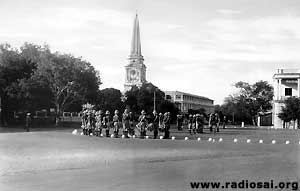
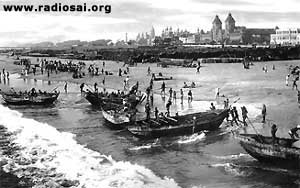
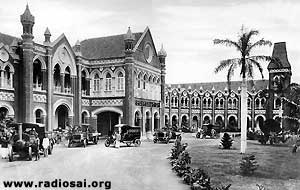
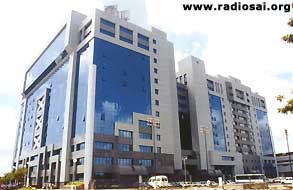

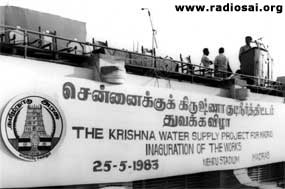
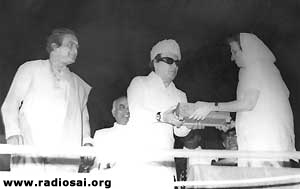
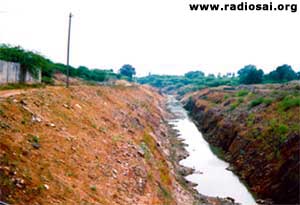

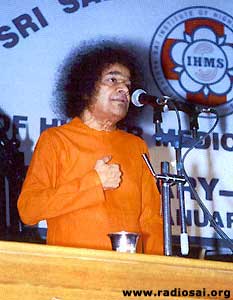









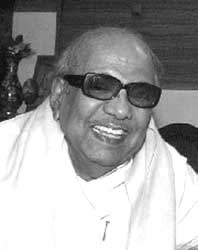
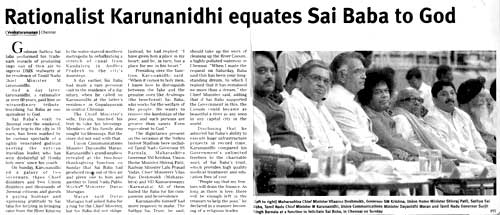
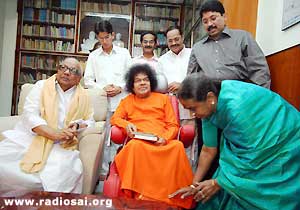
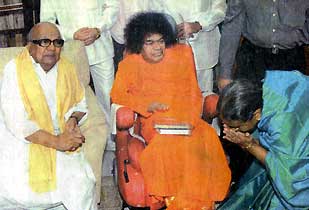
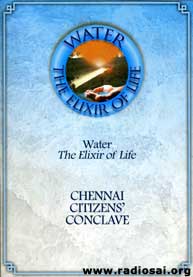
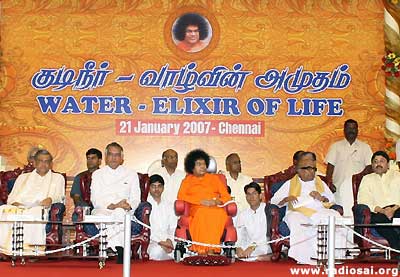
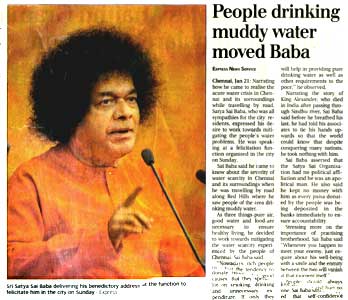
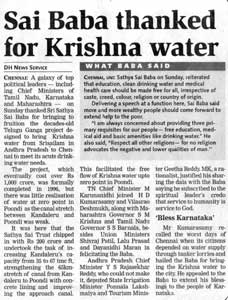
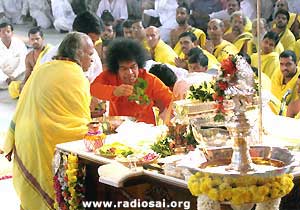
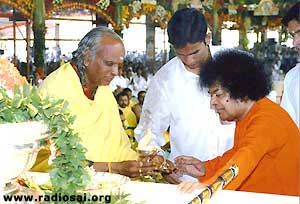
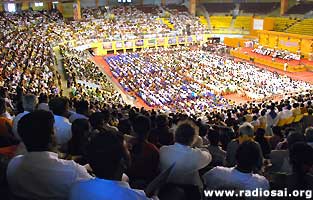
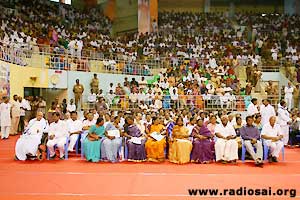
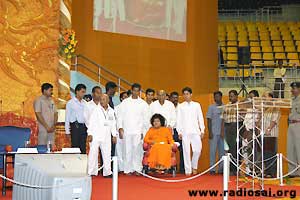
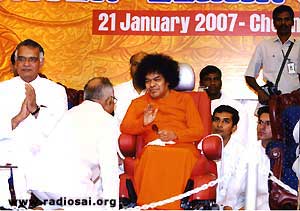
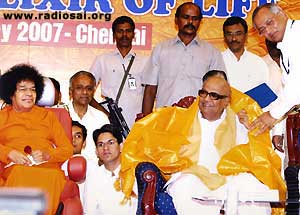
 CHENNAI: Union Home Minister Shivraj
Patil on Sunday stressed the need for adopting a
broad-minded approach to find a lasting solution to
inter-state water disputes.
CHENNAI: Union Home Minister Shivraj
Patil on Sunday stressed the need for adopting a
broad-minded approach to find a lasting solution to
inter-state water disputes.